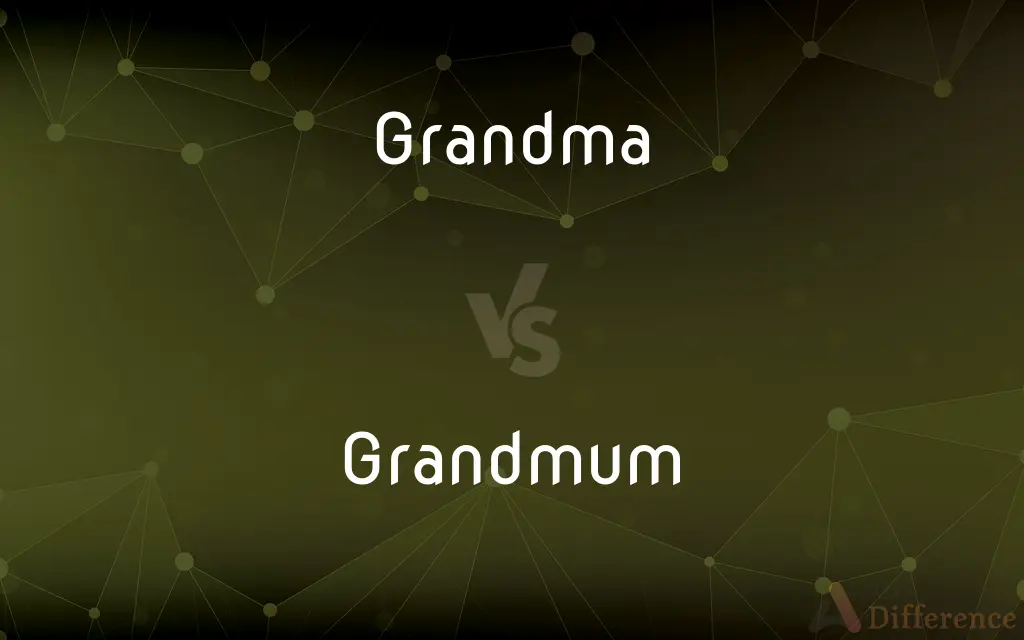Grandma vs. Grandmum — What's the Difference?
Edited by Tayyaba Rehman — By Fiza Rafique — Updated on March 27, 2024
Grandma is a common term in American English for a grandmother, while Grandmum is more often used in British English.

Difference Between Grandma and Grandmum
Table of Contents
ADVERTISEMENT
Key Differences
Grandma is a term of endearment and familiarity used primarily in American English to refer to one’s grandmother. It embodies warmth and affection, often evoking images of family, comfort, and tradition. On the other hand, Grandmum is a variant more commonly found in British English, serving the same familial role but with a linguistic flavor that reflects the nuances of British speech patterns and cultural preferences.
While both terms signify the maternal or paternal mother's mother, the choice between grandma and grandmum can indicate differences in cultural background or personal preference. Grandma is widely recognized and used across various English-speaking countries, whereas grandmum, though understood, is less commonly used outside of the United Kingdom or British-influenced areas.
In terms of linguistic evolution, both terms have undergone simplification and affectionate modification from the more formal “grandmother.” However, grandma tends to be used in more diverse contexts and has several variations itself, such as granny, gram, and nana, reflecting the informal and adaptive nature of American English. Grandmum, while equally affectionate, does not exhibit the same level of linguistic variation within British English, although terms like gran, nana, and granny are also used.
The perception of each term may carry slight variations in emotional connotation or familial intimacy, depending on one’s cultural context or family traditions. For some, grandma might evoke a more homely and traditional image, possibly due to its prevalent use in American media and literature. In contrast, grandmum could be perceived as slightly more formal or quaint, aligning with stereotypical views of British etiquette and speech.
Despite these differences, the essential role and significance of the figure referred to by both terms remain universally recognized and cherished. The grandmother figure, whether called grandma, grandmum, or any other affectionate variant, holds a special place in many cultures as a source of wisdom, love, and familial continuity.
ADVERTISEMENT
Comparison Chart
Usage
Predominantly in American English.
More common in British English.
Variations
Granny, gram, nana.
Gran, nana, sometimes granny.
Cultural Connotation
Often seen as homely and traditional.
May appear slightly more formal or quaint.
Linguistic Variation
Exhibits more informal variations.
Less variation within British English.
Perception
Widely used and recognized.
Less commonly used outside the UK.
Compare with Definitions
Grandma
A term of endearment for a grandmother, prevalent in American English.
My grandma bakes the best apple pie.
Grandmum
Used more commonly within the United Kingdom.
I'll be spending the summer with my grandmum in Surrey.
Grandma
Reflects a casual and affectionate family role.
My grandma is the heart and soul of our family gatherings.
Grandmum
Sometimes perceived as embodying British politeness or formality.
My grandmum insists on proper manners at the dinner table.
Grandma
Often associated with warmth and familial affection.
Spending weekends at my grandma's house is my favorite childhood memory.
Grandmum
A British English term for grandmother, carrying a cozy and affectionate tone.
My grandmum has the loveliest garden in her backyard.
Grandma
Can signify a close, nurturing relationship.
My grandma taught me how to knit and sew.
Grandmum
Holds a special place in the hearts of those who use it.
My grandmum's stories about London during the war are fascinating.
Grandma
Used across a wide range of English-speaking contexts.
Everyone loves my grandma's stories from her youth.
Grandmum
Can suggest a touch of British cultural identity.
My grandmum loves making us tea and biscuits when we visit.
Grandma
A grandmother.
Grandmum
Grandmother.
Grandma
(informal) grandmother
Grandma
A grandmother.
Grandma
The mother of your father or mother
Common Curiosities
Can the term grandma be used in the UK?
Yes, it can be used and is understood, though grandmum or other variations might be more common.
Are there emotional differences in using grandma vs. grandmum?
Emotional connotations may vary by individual and cultural background, but both denote affection and familial connection.
What is the main difference between grandma and grandmum?
The main difference is regional usage, with grandma being more common in American English and grandmum in British English.
Is grandmum considered more formal than grandma?
It might be perceived as slightly more formal or quaint, especially outside of the UK, but both are affectionate terms.
Is one term more affectionate than the other?
Affection is conveyed equally, though personal and cultural associations can influence perceived warmth.
Do the terms have different variations in other English-speaking countries?
Yes, variations like granny, nana, and gran are found across English-speaking cultures, reflecting regional preferences.
How do these terms reflect cultural identities?
They can subtly signal the speaker's cultural background or familial lineage.
Which term is older, grandma or grandmum?
Both terms have evolved from the more formal “grandmother” and have been used for similar lengths of time, adapting to linguistic changes.
Can someone outside the UK use grandmum affectionately?
Absolutely, personal preference and family tradition can influence the choice of term.
Do these terms appear differently in literature or media?
Yes, depending on the cultural setting of the work, the terms can reflect the author's or characters' backgrounds.
Are there specific occasions where one term is preferred over the other?
Not particularly, though personal or cultural traditions may dictate preference in certain contexts.
How have these terms evolved over time?
Both have become more informal and affectionate over time, reflecting changing family dynamics and linguistic trends.
Can grandmum and grandma be used interchangeably?
While understandable, the choice often depends on regional and personal preference.
Does the choice of term affect the role of the grandmother?
No, the term does not change the significant, loving role the grandmother plays in the family.
How do non-English cultures refer to grandmothers?
Non-English cultures have their unique terms, many of which also carry affectionate and familial connotations.
Share Your Discovery

Previous Comparison
Dragged vs. Drug
Next Comparison
Fey vs. FairyAuthor Spotlight
Written by
Fiza RafiqueFiza Rafique is a skilled content writer at AskDifference.com, where she meticulously refines and enhances written pieces. Drawing from her vast editorial expertise, Fiza ensures clarity, accuracy, and precision in every article. Passionate about language, she continually seeks to elevate the quality of content for readers worldwide.
Edited by
Tayyaba RehmanTayyaba Rehman is a distinguished writer, currently serving as a primary contributor to askdifference.com. As a researcher in semantics and etymology, Tayyaba's passion for the complexity of languages and their distinctions has found a perfect home on the platform. Tayyaba delves into the intricacies of language, distinguishing between commonly confused words and phrases, thereby providing clarity for readers worldwide.














































